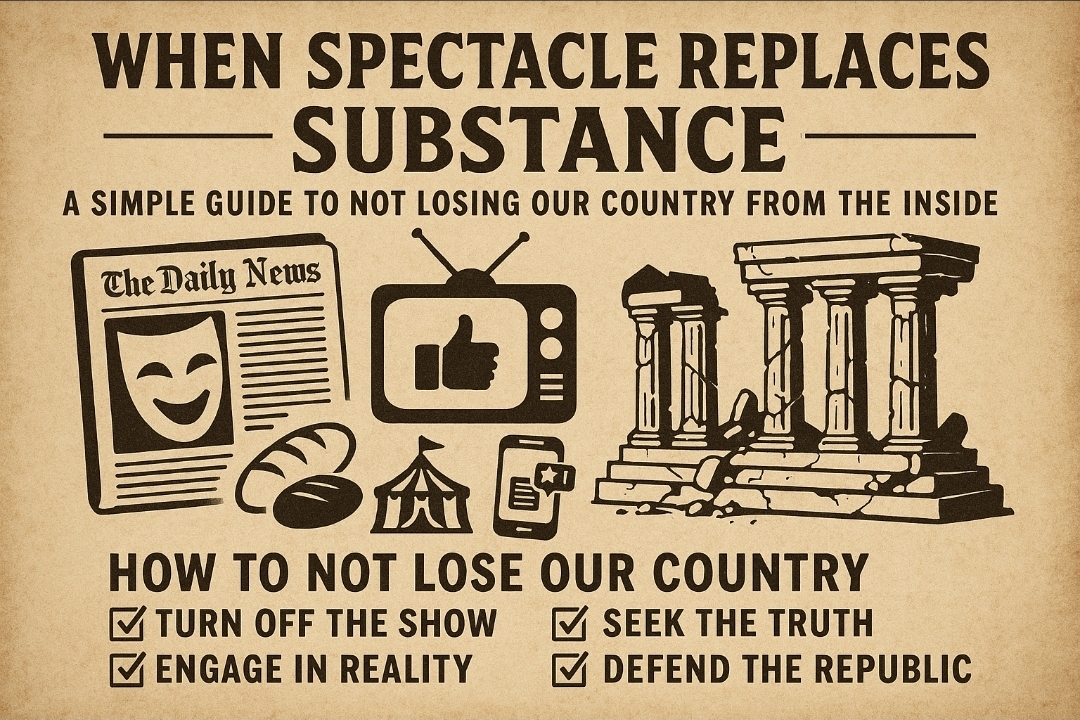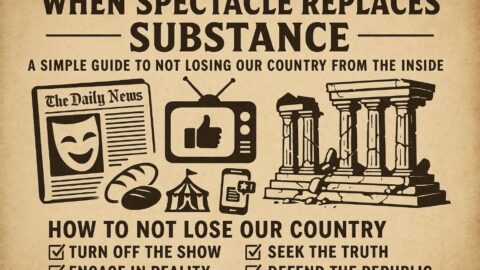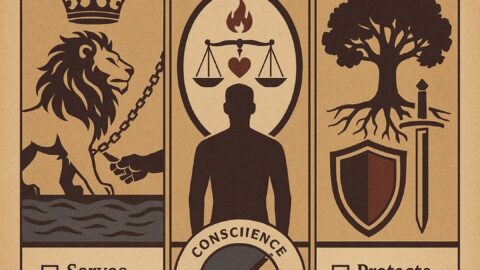Remember the line from Captain America: “The first country the Nazis invaded was their own.” It didn’t start with tanks. It started with wounded pride, big shows, and easy answers. That warning isn’t just movie dialogue—it’s a real pattern in history. And versions of it show up anywhere people trade thinking for cheering, and problem-solving for blame.
This article explains the pattern in plain language and offers everyday ways to push back—no PhD required.
The Sugar High of Spectacle
Spectacle feels great. Rallies, viral clips, “destroyed in 30 seconds!” videos, dunk tweets—these give us a hit of belonging and certainty. But it’s a sugar high: big rush, hard crash, no nutrition.
When a society runs on spectacle, three things happen:
- Wounded Pride Becomes a Rallying Cry
Leaders tell us, “You’ve been humiliated. Only I can fix it.” Anger starts to feel like moral clarity. - Easy Answers Replace Real Plans
Complex problems are boiled down to one villainous group. We punch a face instead of fixing a system. - Shortcuts Become the New Normal
“We can’t wait” justifies bending rules, then breaking them. Soon, fair play looks “weak.”
None of this requires you to belong to a specific party. It’s a human temptation. Any side can fall for it.
Red Flags to Watch For (in Any Tribe)
- Blame beats budgets. Lots of outrage; no timelines, costs, or tradeoffs.
- Enemies everywhere. Critics are “traitors,” “plants,” or “un-American,” not fellow citizens.
- Rule by emergency. Big decisions made by decree, justified by permanent crisis.
- Purity tests. You’re pressured to repeat slogans, not ask questions.
- National drama, local silence. Everyone can recite DC talking points; no one knows what the school board did last night.
If these feel familiar, you’re not crazy—you’re seeing spectacle crowd out citizenship.
What Actually Keeps a Republic Healthy (It’s Not Flashy)
Republics don’t survive on viral moments. They run on slow, boring, adult habits:
- Truth-telling with receipts. Real leaders give details: who pays, who benefits, how to measure results.
- Fair rules for everyone. Due process, equal treatment, transparent lawmaking.
- Local responsibility. Decisions made close to the people who live with them.
- Civic courage. Saying “I was wrong,” “I don’t know,” or “That went too far,” even when your team boos.
These habits aren’t glamorous. They’re the vegetables that keep self-government alive.
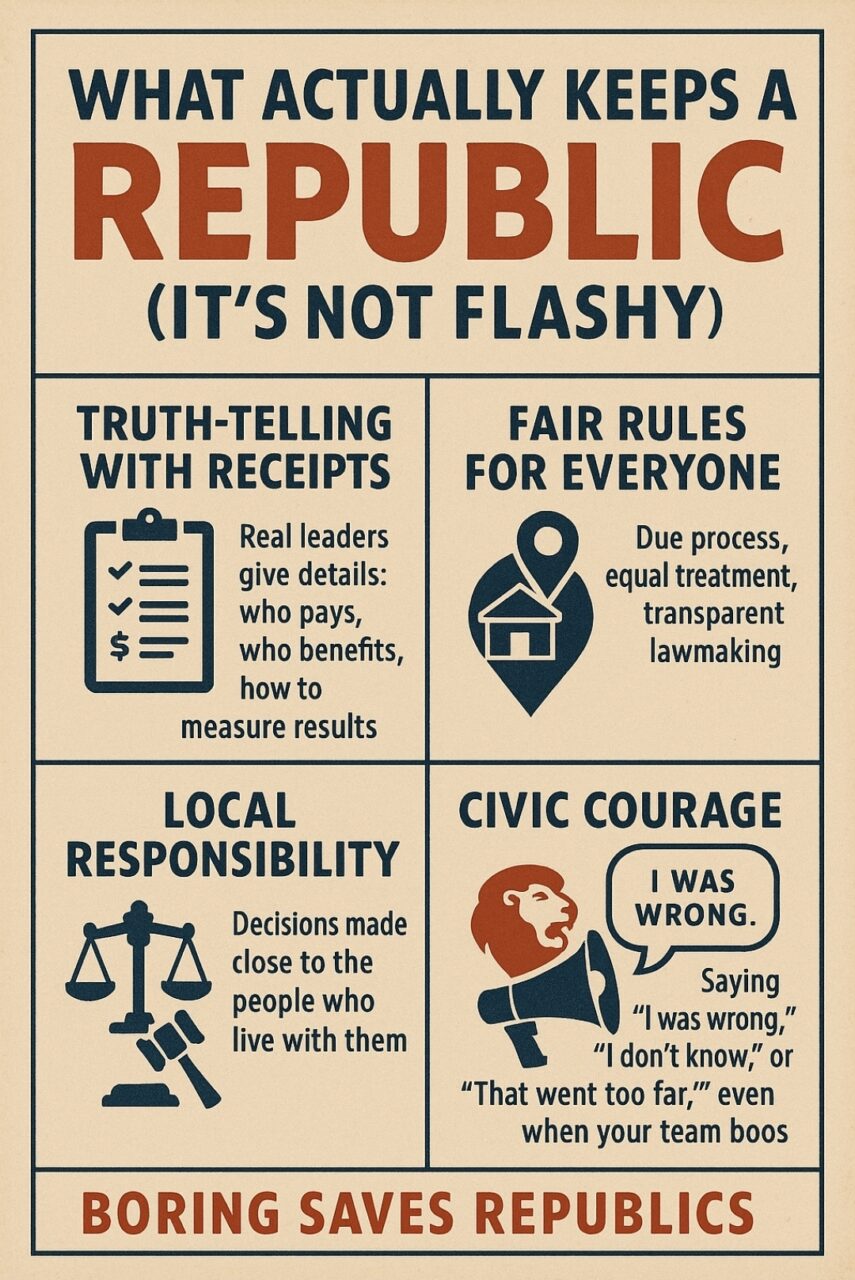
A Simple Checklist for Everyday Life
1) Upgrade Your Information Diet
- Follow two sources you disagree with—not the rage-bait kind, the serious kind.
- Ask of any claim: What’s the evidence? What would prove it false?
- Reward people (even opponents) who correct themselves in public.
2) Demand Grown-Up Politics
- When a politician blames “them,” ask for a plan with dates, dollars, and metrics.
- Support sunsets on emergency powers and public hearings before big rules take effect.
- Prefer candidates who’ve run something tangible (a town, a budget, a school) over those who’ve only run a microphone.
3) Rebuild Local Muscle
- Learn one thing your city council or school board controls. Show up once a quarter.
- Join a ward/neighborhood meeting or start one. Push for small, visible wins (crosswalk, shade trees, after-school jobs).
- Subscribe to a local reporter. National noise is loud; local facts change your life.
4) De-Inflame Your Circle
- Don’t share “gotcha” clips. Share explainers that include tradeoffs.
- In conversation, try: “Strong claim—what would count as enough evidence?”
- Refuse dehumanizing language about neighbors. No one thinks clearly after being called a monster.
5) Practice Micro-Courage
- Say “I was wrong” when you are.
- If your side crosses a line, say so.
- Defend the process even when the outcome doesn’t go your way—you’ll want the same fairness next time.
How We Slide — and How We Stop
The Slide
- Pride gets hurt → Identity locks in
A hit to our image (loss, critique, exposure) flips the switch from curious to defensive. Tribe > truth. - Spectacle rallies us → Emotion replaces judgment
Clips, memes, and outrage become fuel. We trade evidence for applause and confuse virality with validity. - Scapegoats feel good → Complexity gets erased
Blaming “them” relieves anxiety. Systems, incentives, and tradeoffs vanish; punishment becomes policy. - Shortcuts break norms → Ends justify means
“Emergency” becomes a habit: censorship, secret process, executive workarounds. The shortcut becomes the system. - Cruelty is excused → Conscience goes numb
We dehumanize opponents, laugh at suffering, then write it into law. The soul shrinks; the culture coarsens.
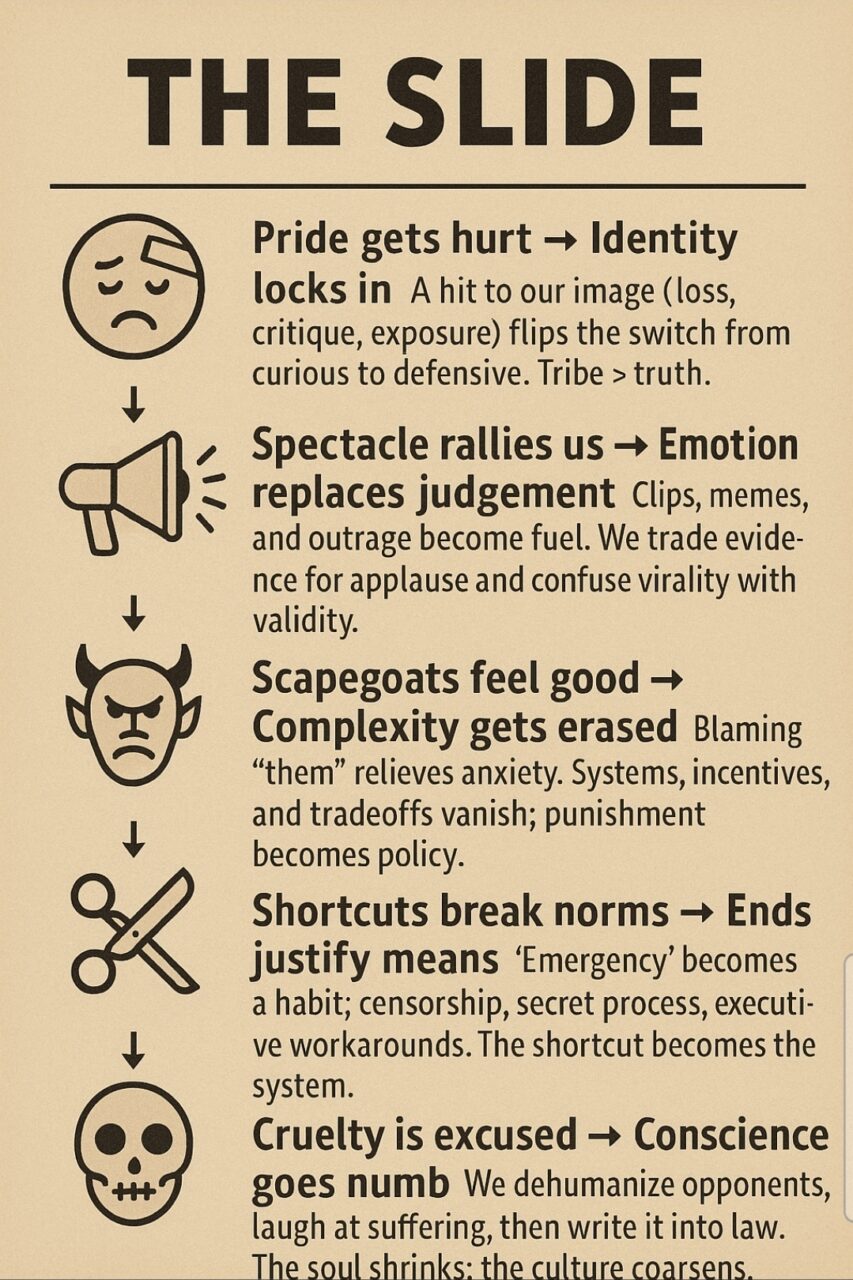
The Stop
- Tell hard truths
Say “I was wrong,” “I don’t know,” and “Here’s the cost.” Require receipts: sources, budgets, and measurable outcomes. - Ask for plans
No more vibes. Who pays? Who benefits? What’s the timeline, metric, and exit? Plans beat performances. - Keep decisions local
Move choices closer to those who live with them. Local accountability corrects faster and resists national hype cycles. - Protect equal rules
Due process, transparent votes, sunset clauses, independent audits—applied to friends and foes. Process is protection. - Humanize opponents
Name wrongs without erasing dignity. Test: Would I support this policy if my own family wore the other label? - Local responsibility: push decisions closer to those affected.
- Civic courage: speak against your own side when it crosses lines.
One-line summary
Slide = ego, spectacle, scapegoats, shortcuts, cruelty.
Stop = truth, plans, localism, equal rules, re-humanization.Thinking
You don’t need permission to start. A block meeting that installs a stop sign on your street does more for the republic than a hundred flame-wars online. A school council that restores recess and improves reading beats a year of yelling at the TV. Small wins create the muscle memory of self-government.
The Takeaway
Erskine’s warning isn’t about Germany. It’s about us. The first country any authoritarian project “invades” is its own people’s minds—flattering us with spectacle, numbing us with easy answers, and convincing us that rules only matter when they help our side.
We can choose a different fuel: truth over theatrics, neighbors over narratives, and slow, steady citizenship over the sugar high of spectacle. That’s how a free people act like owners, not audiences.

